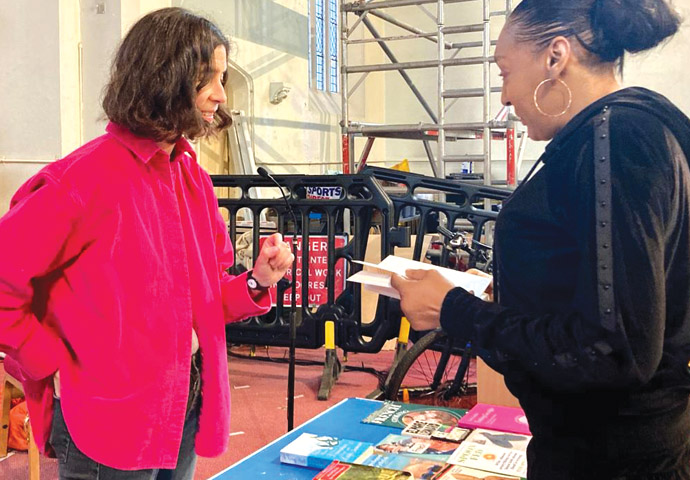
Bookbanks founder Emily Rhodes chatting with a browser
IF you have to choose between heating and eating, the chances are you won’t be browsing the bookshop shelves for a new paperback.
And while the cost of living crisis is often discussed in terms of rent, bills and the prices of what’s in your shopping basket, a charity founder has told how everybody deserves to escape from the stress of it all with a good book.
This is why Emily Rhodes, who founded the Bookbanks and lives in Highgate, has been working to get free books for users of food banks.
An English literature graduate, she has worked for the publishing firm Random House, and for Daunt Books. And this experience led her to establishing Emily’s Walking Book Club, which took bibliophiles across Hampstead Heath for a stroll and a literary discussion. It now has 2,500 members.
It was while volunteering for an Islington food bank that her latest idea came about.
She said: “When I was growing up, books were a world to escape into. It was quite a solitary pastime. But they are also a brilliant way to bring people together. I saw that as a bookseller. I saw I was creating a community and that carried on with the book club. Books offer a way to talk to people. It is a powerful tool.”
She added: “I wanted to do my bit so I volunteåered, and with my background in the book industry I started wondering if we could use books to help build a community here.”
She set up a table of 300 books and the response was such she knew the idea would work.
“The effect was astonishing. People flocked round,” she said. “They picked them up, they talked about them, about what they liked. Some said they weren’t ‘readers’ or did not consider themselves to be, but said their parents or children were.
“But they were taking books for themselves. It was a gateway for people to use the books to talk about their own stories. We gave out more than 50 books that first day – and there were 40 people using the bank, so it shows how popular the idea was.”
Officially launched at the Owl Bookshop in Kentish Town this week, the charity has the support of authors, publishers, booksellers and individuals with large collections they can spare a title from.
Ms Rhodes said: “We have trained volunteers from the book world to work the stalls – editors, publishers, librarians, writers, people with professional experience. We give them training on how to use books as a way to talk to people.
“There can be conversations about a great book, for example, but that acts as a way to start talking about something else. It can become a chance to signpost other services that may be helpful, for example. It gives people the chance to tell their own stories, creating a different space.
“People can come into a food bank feeling tired, hungry, stigmatised, perhaps feeling grim. This helps. Instead of waiting in a queue to collect food, you can browse books and choose ones to take with you.”
The book banks include authors in other languages, a wide range of styles and levels for different readers – and even other tools to help with literacy.
Ms Rhodes added: “We are responsive. For example, in Newington Green here was a request for books by black authors and on black history.
“There was also a big demand for cook books. We can then go to publishers and say this is the titles we want.”